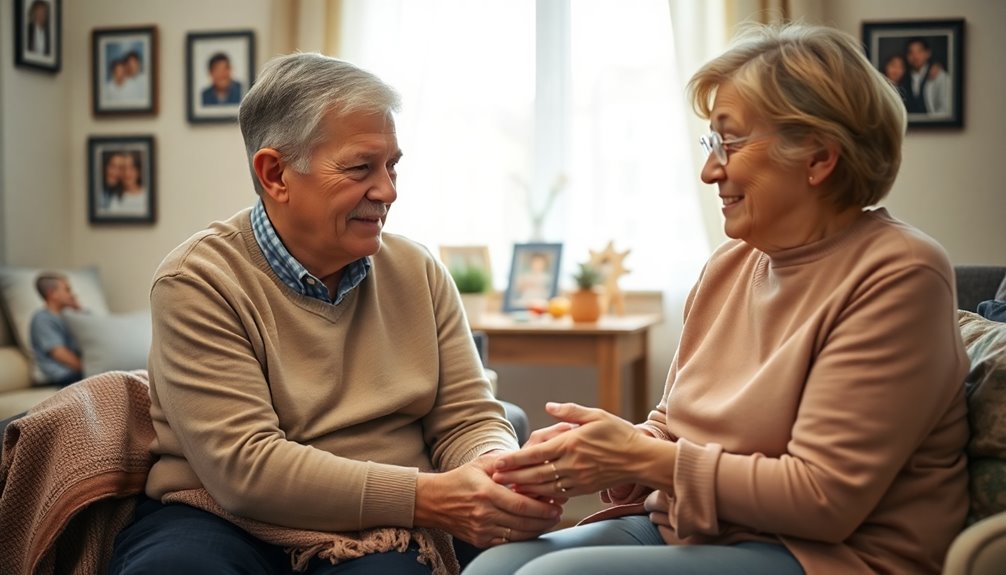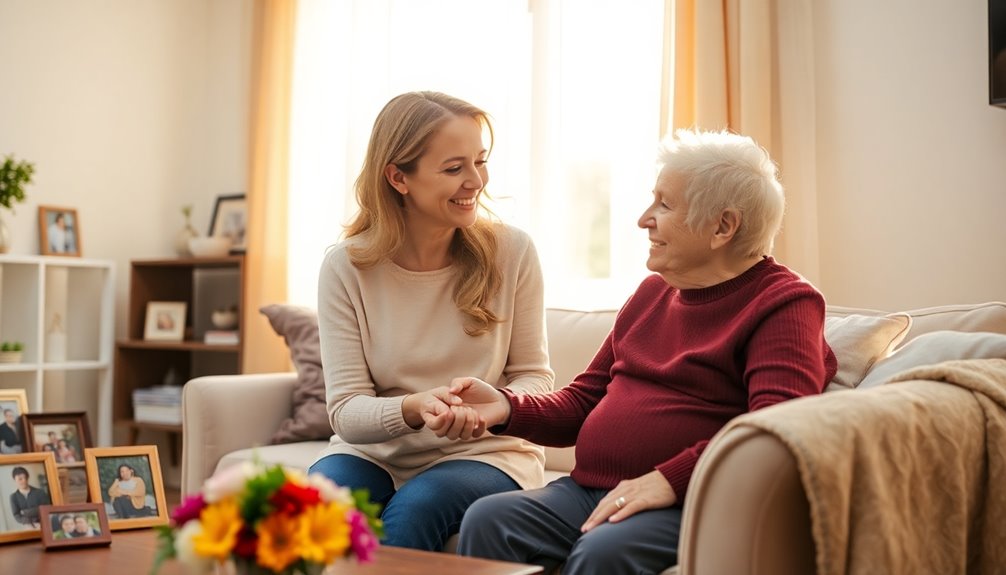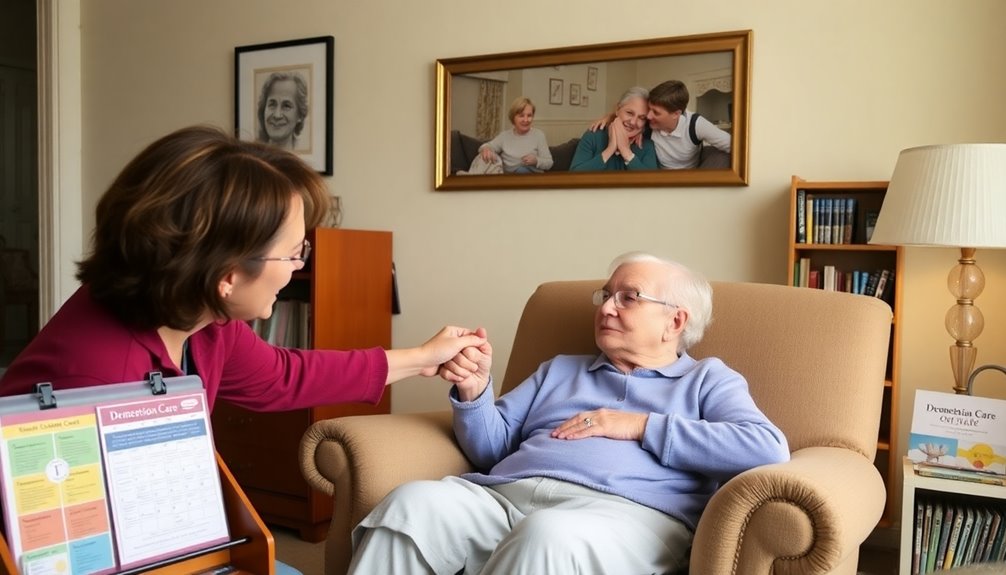Supporting a loved one with dementia requires understanding their behavior changes and using effective communication strategies. Speak slowly, use simple sentences, and listen to nonverbal cues. Create a safe environment and establish routines to minimize confusion. Encourage independence through manageable tasks and meaningful activities that stimulate their cognitive abilities. Remember to offer emotional support and reassurance. If you seek practical strategies to enhance your caregiving approach, there's so much more to explore for effective support.
Key Takeaways
- Use clear, simple language and visual cues to improve communication and reduce confusion.
- Establish a consistent daily routine to provide a sense of security and predictability.
- Create a safe environment by minimizing clutter and implementing safety modifications to prevent falls.
- Encourage engagement in meaningful activities and social interactions to reduce feelings of isolation.
- Consult with healthcare professionals for guidance and support in managing behavior changes effectively.
Understanding Dementia and Its Impact on Behavior

When you're caring for a loved one with dementia, it's important to understand how the disease affects behavior.
Dementia leads to significant behavior changes, including mood swings, agitation, and restlessness. These reactions often stem from unmet needs or environmental triggers rather than personal motivations.
As a caregiver, recognizing that these behaviors aren’t directed at you can foster emotional support and compassion. Understanding the underlying causes helps you communicate effectively and respond to their needs. By acknowledging that the individual’s actions stem from their circumstances rather than personal frustration, you can create a more positive environment for both of you. Additionally, implementing caregiver stress management strategies can help you maintain your own emotional well-being, allowing you to provide the best possible care. Being proactive about your own needs ensures that you remain resilient and capable of supporting those in your charge.
It's also vital to consult healthcare professionals to rule out any medical issues that may contribute to these changes.
Effective Communication Strategies

When communicating with a loved one who's dementia, using simple language is key to enhancing understanding.
It's also important to minimize distractions around you and rely on nonverbal cues to help convey your message.
Simplified Language Use
Effective communication with a loved one who's dementia requires using short, simple sentences that enhance understanding and minimize confusion.
To effectively communicate with a person with dementia, consider these strategies:
- Use simple sentences to convey your message clearly.
- Speak slowly and distinctly, maintaining a pleasant tone of voice.
- Minimize distractions in the environment to help them focus.
- Incorporate visual prompts and gestures to reinforce understanding.
- Listen attentively to nonverbal cues and emotions, responding patiently.
Nonverbal Communication Cues
Communicating with a loved one who's dementia goes beyond words; nonverbal cues are just as important. Focus on nonverbal communication, like eye contact and facial expressions, to convey emotions and build understanding.
Maintaining eye contact can help your loved one feel secure and acknowledged during interactions. Pay attention to body language, as simple gestures like nodding or smiling reinforce understanding and encourage positive responses.
Visual cues, such as pointing to objects or using pictures, can greatly aid comprehension when verbal skills are diminished. Additionally, observing changes in posture or movement offers insights into their needs and feelings, allowing you to provide better support.
Incorporating these strategies enhances your dementia care approach and strengthens your connection.
Minimize Distractions Effectively
Creating a calm environment is essential for meaningful interactions with a loved one who's dementia. Reducing distractions can enhance communication and understanding. Here are some effective strategies:
- Turn off televisions, radios, and other devices to minimize background noise.
- Choose familiar settings for one-on-one conversations to ease anxiety.
- Position yourself at eye level to foster a personal connection.
- Use nonverbal cues like gestures and facial expressions to support your words.
- Keep conversations simple and focused to avoid overwhelming your loved one.
Managing Common Behavioral Challenges

Managing common behavioral challenges in a loved one with dementia can feel overwhelming, especially when unpredictable episodes arise.
To address wandering, create a secure environment with locks and encourage regular physical activity to reduce restlessness.
For incontinence, establish a toilet schedule and use visual cues to guide them, along with easy-to-remove clothing.
When dealing with agitation, minimize noise and maintain daily routines, employing calming techniques like soft music.
For repetitive speech or actions, offer reassurance and engage them in activities to distract from their concerns.
Finally, to counter paranoia, provide nonverbal reassurances and help locate misplaced items, ensuring some controlled access to personal belongings to foster their sense of security.
Creating a Safe and Supportive Environment

As you support a loved one with dementia, establishing a safe and supportive environment is essential to their well-being. Here are some practical strategies to contemplate:
- Minimize clutter to reduce confusion and anxiety.
- Implement safety modifications like grab bars and non-slip mats to prevent falls.
- Use clear labels and signs with simple language to aid navigation.
- Establish a consistent daily routine to provide security and predictability.
- Include familiar objects that evoke positive memories and comfort.
- Additionally, consider incorporating pet therapy as it can enhance emotional well-being and reduce feelings of isolation.
Encouraging Independence and Engagement

While supporting a loved one with dementia, encouraging their independence and engagement can greatly enhance their quality of life. You can start by implementing a daily routine that includes manageable tasks, allowing them to feel a sense of accomplishment.
Break activities into simple steps to help maintain their skills. Incorporate meaningful activities like puzzles, music, or art, which stimulate cognitive abilities and provide enjoyment.
Regular physical activities can also boost mood and foster a sense of normalcy. Facilitate social interactions through family visits or community events, reducing feelings of isolation.
Emotional Support and Compassion

Emotional support and compassion are essential when caring for a loved one with dementia, as they can greatly improve their overall well-being. By fostering understanding and connection, you can truly make a difference in their lives.
Here are some effective ways to provide that support:
- Use physical touch, like holding hands or gentle hugs, to convey love.
- Play soothing music to create a calming environment and reduce agitation.
- Recognize signs of distress and implement calming techniques.
- Validate their feelings to enhance emotional well-being.
- Seek professional counseling for yourself to build caregiver resilience.
- Incorporate calming environments during late afternoon to help reduce anxiety.
Prioritizing emotional support not only benefits your loved one but also nurtures your mental health, helping you face the challenges of dementia care.
Maintaining Positive Relationships

Maintaining positive relationships with a loved one who's dementia is all about adapting to the changes in your dynamic.
You can foster connection through shared activities like life story work or creative pursuits that engage both of you.
Encouraging social engagement and open communication helps strengthen your bond, even as cognitive abilities shift.
Adapt to Current Dynamics
As you navigate the complexities of a relationship affected by dementia, adapting to the current dynamics is essential for fostering positive connections.
Focus on shared activities that encourage engagement and deepen emotional bonds. Here are some strategies to reflect upon:
- Engage in life story work and reminiscence to maintain connections.
- Use creative activities like art and music to enhance communication.
- Address any longstanding issues through open conversations.
- Support existing connections with family and friends.
- Honor your loved one's previously expressed wishes to reinforce their sense of identity.
Additionally, practicing open and honest communication can significantly improve your relationship with a loved one experiencing dementia.
Encourage Social Engagement
While dementia can create barriers to social interaction, encouraging engagement with family and friends is crucial for fostering positive relationships.
Regular social engagement greatly enhances your loved one's quality of life, reducing feelings of isolation and depression. Arrange opportunities for them to interact with others, as these connections provide essential emotional support and a sense of belonging. Incorporating activities that involve educational and skill-building toys can further stimulate their cognitive function and promote interaction in a fun, engaging way.
Support groups can be particularly beneficial, allowing them to socialize with peers who understand their experiences. Additionally, involve them in structured social events or creative activities that stimulate their cognitive function and encourage meaningful connections.
Utilize Creative Activities
Engaging in creative activities provides a wonderful way to deepen connections with your loved one while also enhancing their cognitive function and emotional well-being.
Consider incorporating the following activities:
- Art therapy: Encourage painting or drawing to foster expression and accomplishment.
- Music: Play familiar songs to evoke memories and stimulate positive emotions.
- Crafts: Engage in simple crafts that promote creativity and interaction.
- Dance: Move together to music, enhancing connection through rhythm and fun.
- Storytelling: Share stories or create new ones together, encouraging social interaction.
These creative pursuits not only boost emotional well-being but also enrich your bond, providing a purposeful activity that reduces agitation and enhances satisfaction. Engaging in activities like music can also enhance cognitive abilities, improving memory and attention in your loved one.
Decision-Making for Caregivers

Effective decision-making for caregivers requires a deep understanding of the loved one's previously expressed wishes and preferences. You'll want to guarantee that your choices align with their values and best interests.
Assume mental capacity exists unless proven otherwise, encouraging your loved one to participate in decisions about their care. Focus on selecting the least restrictive options to promote their independence and autonomy.
Clear and straightforward communication is essential; use simple language to help them understand and engage in the decision-making process.
Resources for Caregiver Support

Maneuvering the complexities of dementia care can be overwhelming, making it essential to seek support and resources tailored for caregivers.
Here are some valuable resources to take into account:
- Alzheimer's Association: Call their 24/7 helpline at 1-800-272-3900 for immediate assistance.
- Family Caregiver Alliance: Access extensive educational materials and advocacy specifically for caregivers.
- Local Area Agencies on Aging: Find support groups and workshops designed for caregivers in your area.
- Dementia Support Forum: Engage with online communities to share experiences and gain insights.
- International hotlines: Explore dedicated programs like the Alzheimer's Society in the UK for localized support.
Utilizing these resources can help you feel more supported and informed in your caregiving journey.
Frequently Asked Questions
How to Support a Caregiver of Someone With Dementia?
To support a caregiver, you should encourage them to join support networks.
Offer practical help with daily tasks, giving them a chance to recharge.
Remind them to prioritize self-care, as neglecting their well-being can lead to burnout.
Listen to their concerns and validate their feelings, providing reassurance when needed.
Finally, suggest educational resources or workshops to deepen their understanding, which can empower them and make their caregiving journey easier and more manageable.
What Are Three Challenges Caregivers Face When Caring for Dementia Patients?
Caring for someone with dementia can feel like maneuvering through a foggy maze, where every turn brings new hurdles.
You face emotional strain as you mourn the person they once were, while communication barriers leave you grappling for words.
Behavioral changes can turn peaceful moments into storms of frustration, demanding constant adjustments.
And if you neglect your self-care, fatigue can creep in, making the journey feel even heavier.
It's a challenging path, but you're not alone.
What Are 5 Communication Strategies You Can Use While Caring for Someone With Dementia?
When caring for someone with dementia, you can use several communication strategies.
Start by using simple, clear language to avoid confusion. Minimize distractions in the environment to help them focus.
Make statements instead of asking questions, like saying "It's time to eat." Listen patiently and pay attention to their nonverbal cues.
Finally, utilize validation therapy by acknowledging their feelings to reduce agitation and foster a sense of understanding.
What Are Six Strategies That Are Useful When Assisting People With Dementia to Get Dressed?
When assisting someone with dementia to get dressed, simplify choices by offering two or three outfits. Use easy-to-remove clothing like elastic waistbands.
Establish a consistent dressing routine to create familiarity. Break the process into small steps, offering gentle assistance and encouragement.
Maintain a calm atmosphere by using music or familiar items, and always give them ample time to complete each step.
This approach can help reduce frustration and promote independence.
Conclusion
Steering the journey of caring for a loved one with dementia can feel like sailing through stormy seas, but with the right strategies and a compassionate heart, you can find your way to calmer waters. Embrace each moment, celebrate small victories, and remember that your support is a lifeline. By fostering understanding and connection, you not only help them thrive but also enrich your own life. Together, you can weather the storms and bask in the brighter days ahead.









